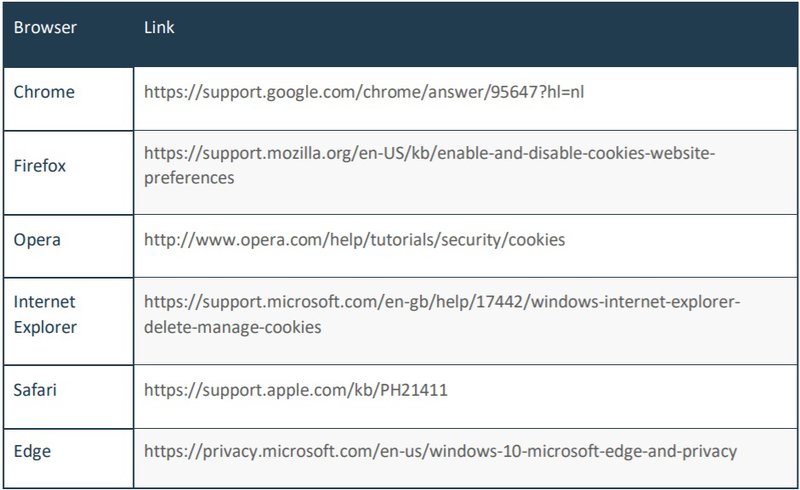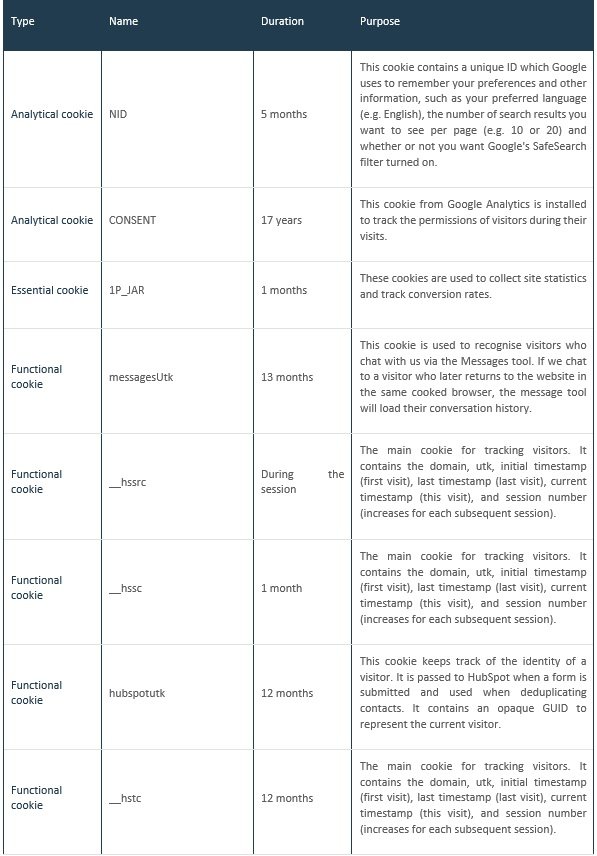Cookie Policy
Labconsort BV
Apart from the data you voluntarily share with Labconsort BV (hereinafter "Labconsort") when using the Labconsort website, www.labconsort.com (hereinafter "Labconsort Website"), Labconsort also uses cookies and other technological means to collect data.
All information, whether in the form of text, files, images or any other form is provided by Labconsort for informational purposes only.
Any interested person may take cognisance of this information, but Labconsort reserves the right, at the time it sees fit, without any prior warning, to change the rules and conditions governing access to and use of the Labconsort Website, or to subject the whole or parts of the Labconsort Website to a restriction.
Access to such private areas of the Labconsort Website may be conditional upon the provision of information by a visitor/user of the Labconsort Website. The visitor/user providing such information expressly agrees that such information shall become the property of Labconsort and that by the mere provision of information to Labconsort, the latter is expressly authorised to use such information in accordance with the Privacy Policy.
Granting access to the private area of the Labconsort Website by means of user names and passwords, can at all times be changed or refused by Labconsort without this leading to any compensation.
Article 1. Why do we use cookies?
This Cookie Policy describes the cookies we use on the website and what they are used for. We use cookies for the following reasons:
- To ensure the website works properly and you have an optimal user experience.
- To understand the number of visitors to our site and the pages they view.
- To make it possible to integrate social media on the website.
- To generate advertisements tailored to your needs.
Article 2. What is a cookie?
A cookie is a simple, small file that is sent with pages from this website and stored by the browser on your computer's hard drive. The information stored therein can be sent back to our servers during a subsequent visit. A cookie is a file containing an ID (a string of letters and numbers) that is sent by a web server to a web browser and stored by the browser. The ID is then sent back to the server each time the browser requests a page from the server. Cookies are small pieces of data stored in a visitor's browser. They are typically used to track which settings users have selected and the actions they have taken on a site.
Cookies cannot be used to identify individuals; a cookie can only identify a machine. Cookies do not usually contain information that personally identifies a user, but personal information that we store about you may be linked to the information stored in and obtained from cookies.
Article 3. Use of Persistent Cookies
A persistent cookie enables us to recognise you when you visit our website again. The website can therefore be adjusted to your preferences. Also when you have given permission for placing cookies, we can remember this by means of a cookie. This saves you having to repeat your preferences over and over again, which saves you time and makes it easier for you to use our website. Persistent cookies can be removed through the settings of your browser.
Article 4. Use of session cookies
Using a session cookie, we can see which parts of the website you have viewed during this visit. This enables us to adapt our service as much as possible to the surfing behaviour of our visitors. These cookies are automatically deleted as soon as you close your web browser.
Article 5. Google Analytics
Through our website, a cookie is placed by the company Google, as part of the 'Analytics' service. We use this service to track and get reports about how visitors use the website. Google may provide this information to third parties if Google is legally obliged to do so, or insofar as third parties process the information on Google's behalf. We have no influence on this. We have not authorised Google to use the analytics information obtained for other Google services.
The information that Google collects is anonymised as much as possible. Your IP address is expressly not provided. The information is transferred to and stored by Google on servers in the United States. Google claims to adhere to the Privacy Shield principles and is affiliated to the Privacy Shield program of the U.S. Department of Commerce. This means that there is an adequate level of protection for the processing of any personal data.
Article 6. Right of access and correction or deletion of your data
You have the right to request access to your data, as well as the correction or deletion of your data. You can send your question via the online contact form. To prevent abuse, we may ask you to provide adequate identification. When it comes to access to personal data linked to a cookie, you must send a copy of the cookie in question. You can find this in the settings of your browser.
Article 7. Enabling and disabling cookies and deleting them
You can set your internet browser in such a way that cookies are not accepted, that you receive a warning when a cookie is installed or that the cookies are subsequently removed from your hard disk. More information on enabling, disabling and deleting cookies can be found in the instructions and/or by using the Help function of your browser.
Most browsers allow you to refuse cookies and also to delete existing cookies. The methods for doing this vary from browser to browser and from version to version. Please note, however, that certain graphic elements may not appear correctly or that you may not be able to use certain applications.
You can obtain up-to-date information on blocking and deleting cookies via these links:

Article 8. What kind of cookies we use

Do you have questions or comments about our Cookie Policy? You can send us your question via the online contact form.